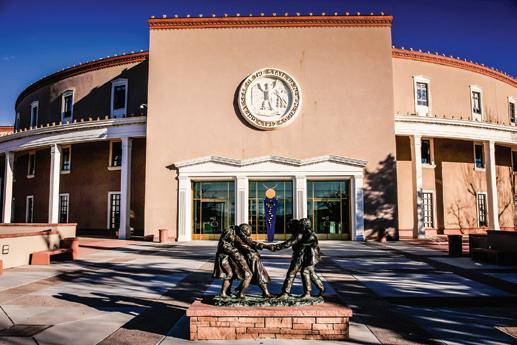
2 minute read
2023 Legislative Session & Capital Outlay
On January 12, 2023, the Legislative Finance Committee released a budget recommendation for the 2023-2024 fiscal year that calls for spending $9.44 billion from the state’s general fund, a 12%, or $1.04 billion, increase over FY23 planned spending. Reserves would be 30% of planned spending, safely above the levels that served the state well during the plunge in income at the start of the pandemic, and with room for additional recommendations for fund transfers and tax changes. The recommendation includes $109 million to expand Pre-K, and $263 million recurring and $261 million nonrecurring more for public schools, primarily for a new K-12 Plus factor in the public school funding formula and school-year calendar changes. The plan for public education is a total of $4.14 billion, or 6.8% more than the current year. In addition to extended school time, the recommendation funds an increase for services aimed at students identified as at-risk for failure, the educator pipeline, reading interventions, and implementation of the Indian, Bilingual Multicultural, and Hispanic education acts.
General Fund appropriations for the Early Childhood Education and Care Department would increase by nearly 72%, with the additional funding from the constitutional amendment approved by voters in November. In addition to the major expansion of Pre-K, the spending plan includes $8 million for home visiting parent education and support services for new families. Early childhood services would get an additional $70 million from the Early Childhood Trust Fund for childcare for infants and toddlers and other child services, including behavioral health. The committee recommendation also includes $80 million to backfill federal Medicaid spending, which will drop with the official end of the public health emergency, and $328 million for average pay raises of 5% for state and education employees. It contains additional funding to increase the employer contributions to the public employee and educator retirement funds.
Advertisement
Other priorities in the budget include New Mexico Opportunity Scholarship, Medicaid rates for healthcare providers, and behavioral healthcare for children, in addition to targeted salary increases for university faculty, judicial agency staff, child protective services workers, forensic scientists, and public school principals. In addition to recurring spending, the committee proposal includes $1.145 billion in spending for special projects, roads, and information technology.
During the 60-day legislative session which started on January 17, legislators are expected to receive millions in Capital Outlay funds for projects in their home districts. In 2022, the Governor received $160 million in Capital Outlay, each senator received $3.1 million, and each House member received $1.86 million. More than $823 million was proposed for capital projects statewide during the 2022 session.
With the state projecting increased revenues and recommendations for Capital Outlay appropriations, the Village of Ruidoso is preparing by increasing the Village’s ability to administer large projects. The VOR has submitted the following five Village Council-approved Legislative Capital Outlay Requests totaling $9,413,363 million.
» Workforce Housing ($1,000,000)
» Broadband Fiber Connectivity ($1,000,000)
» Bridge Replacement Construction ($6,000,000)
» Sewer Infrastructure Construction Improvements ($913,363)
» Outdoor Recreation Infrastructure Development ($500,000)
The capital improvements planned by the Village are a strategy in the efforts for economic recovery and are quality-of-life initiatives aimed at improving the Village’s aging infrastructure, in addition to enhancing the recreational asset.










